The reason I asked to interview Katie Kleiger is that after I saw her in Sarah DeLappe’s The Wolves at Studio Theatre, I realized I had seen her on the same fourth-floor stage in Lucy Prebble’s The Effect. But the contrast between Kleiger’s performances in The Effect and The Wolves was so great I didn’t make the association till I went home read her bio.
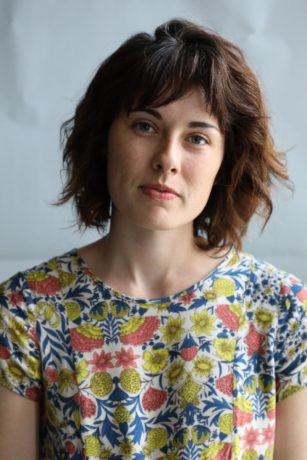
In The Effect, Kleiger played 26-year-old Connie, and she and Rafi Silver as Tristan had an amazing chemistry on stage. They fall in love while they are subjects in a clinical drug experiment, and as actors they both seemed so totally connected it felt like watching real life.
Now in The Wolves, Kleiger is playing a high school soccer player identified as #7, the number on her uniform. She’s 16 going on 17, and she and her teammates have an amazing chemistry on stage. They practice hard together, they play hard together, and they seem so totally connected it feels like watching real life.
So I wanted to begin with an acting-craft question, about those two roles and the rehearsal process Kleiger went through for each…
John: How was building onstage romantic chemistry with a male actor for The Effect different from building onstage cohesion (athletic and otherwise) with the eight other female actors in The Wolves?
Katie: That is such a great question. In The Effect, the building of the chemistry with Rafi was a process we both willingly chose to go down together. We had conversations about that exact thing, which is: to pull this story off, to do it well, he and I had to make an agreement to really love each other and care about each other as actors and as people first. It certainly didn’t hurt that we actually did like each other as people and got along very well. And we basically spent a ton of time together. We got food together every day, we always walked home together after rehearsal. We got to know each other really well.
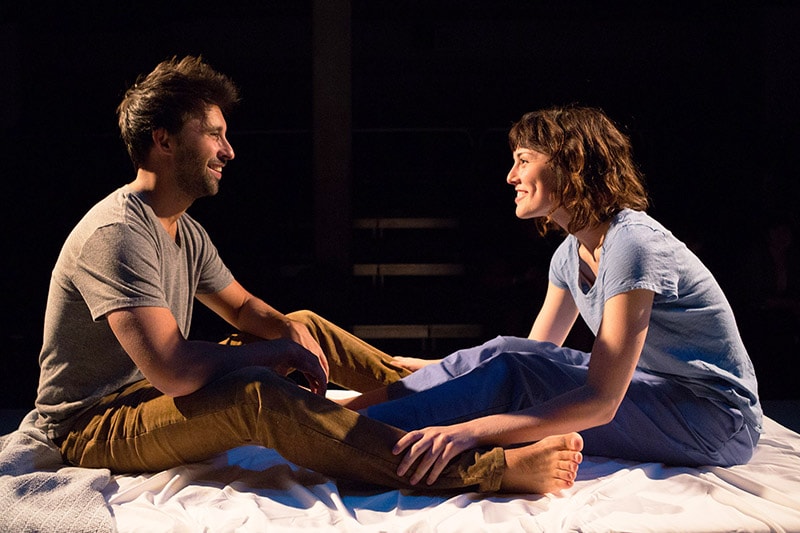
The two of you were very intimate onstage. Did you have an intimacy choreographer working with you?
No, it was David [Muse, the director] who was working with us. I’ll say I was really anxious about it, and it was Rafi who at that point was a support for me in terms of making me feel comfortable. We—me, Rafi, and David—worked together on those scenes just the three of us for a while and didn’t introduce anyone else into the room. Eventually, Rafi and I became such close friends that I totally lost any nerves I might have had about the intimacy of those scenes. It was like being with a really close friend—we just happened to be in our underwear. We were so comfortable with each other it really didn’t hold any anxiety or stress for me.
The authenticity of that one-to-one relationship was one of the major appeals of that production, and I can’t imagine the play working without it. There was never any imbalance; it was always clear that it was the two of you breathing together.
So now The Wolves. It’s an all-female cast and there’s a lot of them.
I was actually really anxious about starting rehearsals for The Wolves because I was also performing in The Book of Will at Round House so I was worried about not being fully present for the necessary bonding period, which usually happens in the first few weeks of rehearsal. It’s the natural life of a theatrical process that people come to know different layers of each other, each week, which is so important and formative for onstage relationships.
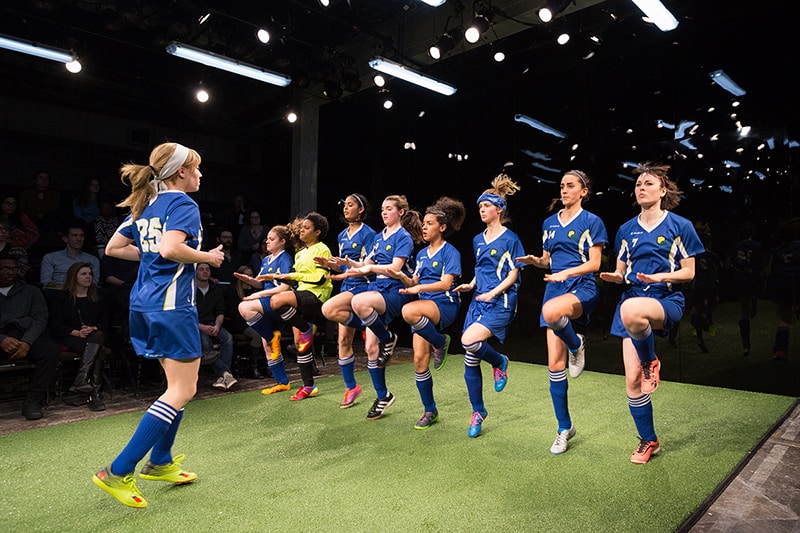
We were having long days, ten to six every day, all of us called every day. Oftentimes, the first half of the day was soccer and the second half of the day was on our feet. Marti Lyons, our incredible, unbelievable director, and our movement coach Stephanie Paul both knew that we needed to get on our feet right away. And being with those girls from ten to six every day was the bonding for me. There was something about embodying these teenage girls—who are all archetypes that in a sense fit parts of who we were.
Certainly, I was not #7 in all of her ferociousness. I will say though that when I read the script last year, absolutely she was the girl I wanted to play. Because there was absolutely a part of me—minus the makeup and minus maybe some of the blunt rudeness. Like, I cursed all the time. I was always putting up a front that I was stronger, tougher than in reality I ever was. That was who I was in high school.
So we were all embodying these people who, I think, capture something insecure about parts of our past. And being in that space was so vulnerable because of that. And what that turns into is a really strong bond right away, ’cause we’re getting to know each other as actors but we’re also getting to know each other as high schoolers.
The dialog that would take place in the room from the first day resembled the play. The stage manager or the director would be like: wait, this is the play. We’d be talking on break about like something or other, like: did you see the video, the video on YouTube? Ohmygod that guy…! And honestly, it was like different versions of the play. So the bonding happened really quickly, really naturally.
The bond among the teammates was so believable to watch, so powerful and nonstop. Even when they were sniping at each other, there was a sense they were connected. It was some of the most extraordinary ensemble work I can recall seeing on stage.
READ Hilary Sutton’s review of The Wolves.
One of the fascinating things about the play is how within all the precisely choreographed teamwork and overlapping conversations, we get to know each of the players as individuated characters—and yours stands out as one of the most memorable. A colleague of mine at DC Theater Arts told me your character reminded her of Rizzo from Grease. And another asked me to tell you that you’re her new girl crush.
I love that.
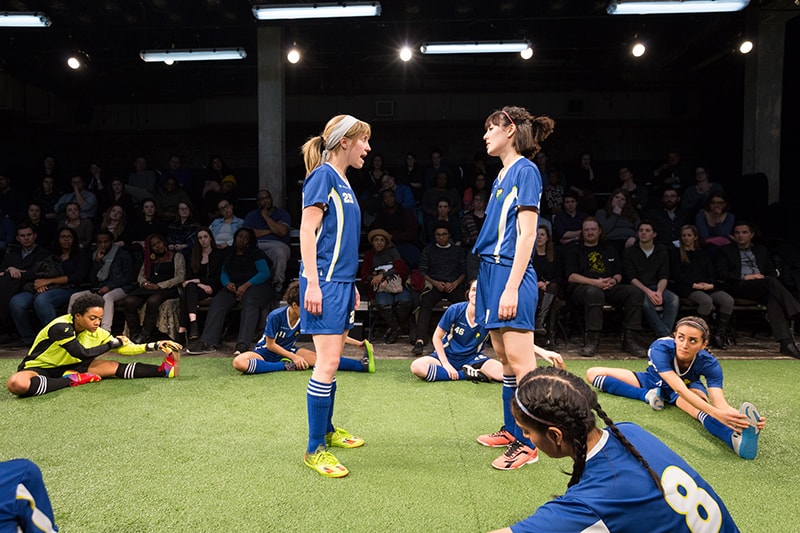
Who is #7 in the play, who is she to you, and what was your process in finding the character?
I love #7. I always have. She can play the antagonist to some people’s stories, but in no way do I see her as any sort of bad guy or villain. In all of her crass, rude loudness, behind it all was humor. Week one I mentioned to the director that what I really wanted to stress with this character was that she really was going for laughs with the group. Nothing that she does is to hurt intentionally, unless that leads to humor, unless that leads to laughing. And the reason I felt that way is because that’s how I was in high school.
#7 seems the angriest and has a socially disruptive streak. She drops f-bombs throughout; she calls teammates bitches. Where do you think that’s coming from?
I’ve done extensive thinking about her background, and about what she grew up with. I had this idea that she grew up with just her father, and my guess was that he curses a lot and she picked it up from him. I do think that calling people bitch, whore, anything like that, that’s just her vocabulary, that is how she talks, almost endearing. Also, she loves to say what others won’t because that gives her attention and it gives her a response. So she will not ever be ignored; she will always be in the spotlight. She’s the alpha of the group, and to stay the alpha she will do that shock and awe thing.
#7 seems the most socially mature of the group. She’s the only player who has a boyfriend, the only one who’s had intercourse.
Yeah. She definitely would be happy for you to say that because she certainly wants people to think she’s the most socially mature. I think she puts up a front that she’s socially mature. And she does everything she absolutely can to maintain that appearance.
What’s your favorite moment or line of hers?
My favorite moment of the play is the hardest moment in the play, the end. Before I come back on in the last scene, I take off all my makeup backstage. There’s something about taking off all her makeup, for me, that is like very symbolic of her journey.
There’s a marvelous stage direction in the script: “They giggle as only 16-year-olds can.”
Oh, I know!
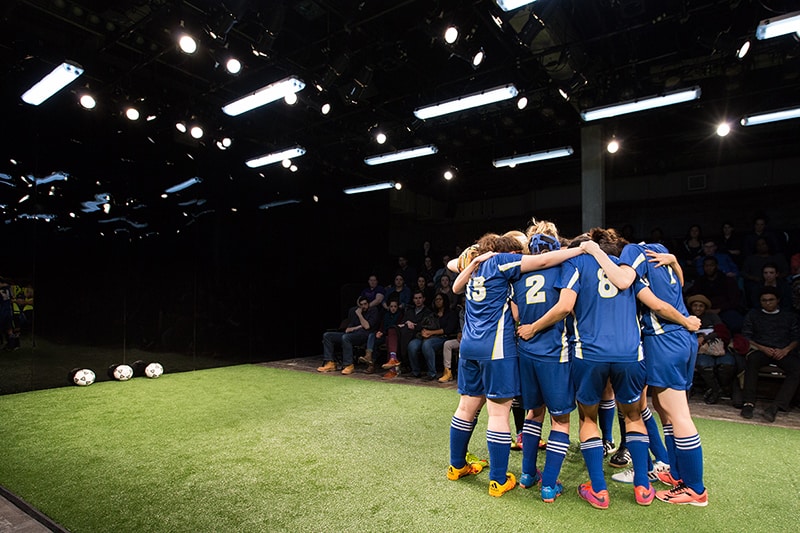
Would you talk about what the play says about the dynamics of female friendship? And what you’ve learned about those dynamics from being in this show with these castmates?
We spent a lot of time on that stage direction because we love it too. We revert back to our teenage selves when we are with each other, and it is so great. Being a teenage girl is not that great, there’s so much that is not great about it—god, we discussed plenty of that in rehearsal. There’s so much judgment as teenagers. But when you’re with your friends, when you’re in that safe friend space, there’s so much nonjudgement.
At that age, you’re not censoring yourself as you would be in front of a boy you liked. But in that group of soccer girls, you’re just going, at the top of your lungs, like a nonjudgement of yourself, just saying what you really feel, whether that gets you in trouble or not. And the giggling as only 16-year-old girls can is this involuntary “I’m laughing ’cause you’re laughing.”
Have you talked after the show with any high-school-age girls who’ve seen The Wolves?
Oh, not yet. But we have a few student matinees,* and I cannot wait.
What do you suppose teenagers can get out of The Wolves, what do you think would be the takeaway for them?
Obviously, I want teenage girls who are interested in theater to go see this show. I also want teenage girls and teenage boys who are not interested in theater to come to this show. A friend’s sibling who saw the show said, “I didn’t know theater could be like this.” And that’s what I want teenagers to get. I think we could get a ton of first-time theatergoers coming to see this show and realizing: oh, theater is something actually that can reflect me; I’m actually being reflected on stage and I’m being seen, and heard, and understood—not judged.
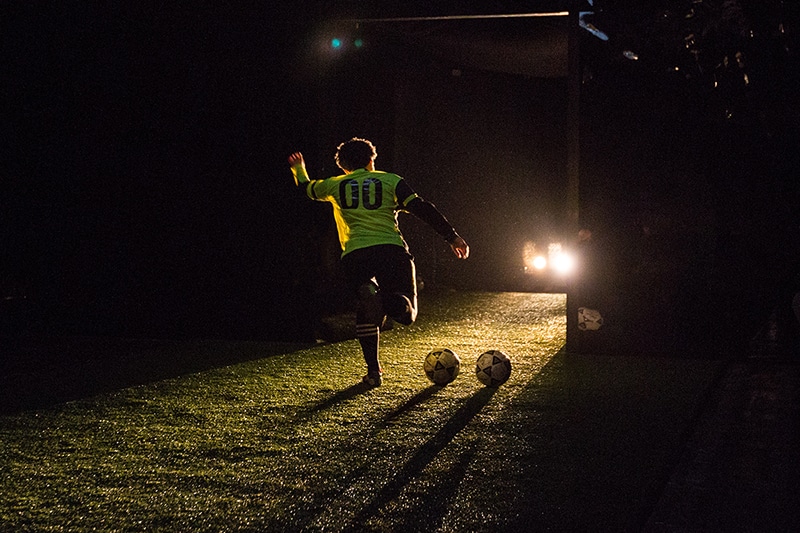
The appeal and significance of The Wolves for anyone who is or was a 16-year-old girl is plain as day, especially in the performances now on stage at Studio. Why do you think young men, and for that matter older men, should want to see this play?
Easiest, quickest answer is that it’s a good piece of theater. It is not one of those things that should be exclusively for anyone, simply because of Sarah DeLappe’s beautiful, beautiful writing. Digging a little deeper, I think anyone who has loved a 16- or 17-year-old girl will love this. My dad is seeing the show Saturday. He coached my soccer team when I was really young. He watched me grow up. And I cannot wait for him to see this, because for a parent, or anyone who’s known a 16- or 17-year-old girl, it allows them to see so many sides of who these people are. It will not only pay homage to what they already know is there. It will actually open their eyes to see that these girls are so much more than they appear.
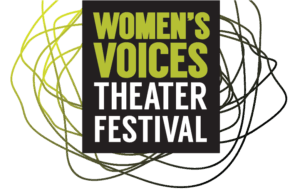
For a long time in my life, I was an athlete just as much as I was an actor. Then when I went to boarding school when I was a junior I basically stopped all sports. I still taught tennis in the summer, but there were no sports offered at my school because it was an arts school. At that moment, at the age of 17, I chose to focus on acting only. But up until then, I was a very serious tennis player from age 7 or 8 to 17-18. I was a soccer player; I dropped soccer to play tennis. It was another way of defining myself. In those formative years, it’s really nice to say “I’m an actor” or “I play tennis.” You have your thing, your ways of identifying who you are. It was important.
What do you think The Wolves is saying about the role of sports in the lives of these nine girls?
One of the reasons The Wolves is so incredible is because the classic trope of preparing for battle is being spun into the hands of nine teenage girls. You get that with the sound, the lighting, big drums and then lights up on these nine teenagers…and we’re talking about periods. But at the same time, our director always said, we are never to forget: you are preparing for battle—every single week. That’s about taking these girls seriously. Because no matter how silly our conversation gets, we’re athletes, and we are warriors, we are good, we win, we go to finals, and we’re to be taken seriously. That’s never lost in the show. That was what was important for me. It was a warrior thing. It was a time of my day that wasn’t sitting down in class or acting on stage where there was a simple path, and that was: to win. And doing so with my fellow women was an incredible part of my day.
What do you think girls’ sports has meant for the women’s movement?
We were all told to watch Dare to Dream, which is a documentary about the women’s national soccer team, and it’s all about the question you just asked, which is: putting women in this mode, this beast mode, this warrior mode. It’s de-associating the winning mentality and physicality necessary to win with masculinity. It’s showing the world what we’re capable of. And it’s asking the world to take us more seriously.
When you Google the phrase “do women soccer players,” the first thing that comes up is “make money” or “wear underwear” or “wear thongs” and then “wear makeup.” It seems like the number one topic of concern for female sports players is their appearance. And in response to the first google search topic, the truth is women soccer players do not get paid nearly as much as men. They often have to have second jobs, and they can’t make a living off of what they’re doing, unlike their male counterparts. So as important as women’s sports is to the women’s movement—it’s 100 percent steps in the right direction—we can never lose sight of the fact that there’s still so much further to go. And maybe one day the Google searches won’t be about our underwear.
The Wolves plays through March 11, 2018, at Studio Theatre – 1501 14th Street NW in Washington, DC. For tickets, call the box office at (202) 332-3300, or purchase them online.
* Student matinees of The Wolves are February 15 and 21, 2018, both performances starting at 11 am with preshow activities starting at 10 am. For more information email studentmatinee@studiotheatre.
Sarah DeLappe (Playwright)



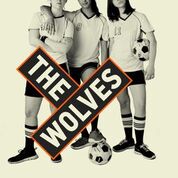


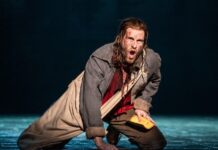
Thanks for this interview. My wife and I were grabbing a bite to eat after seeing “The Effect” and watched Katie and Rafi walk down the street together after the show. It looked as natural and as intimate as their time on stage had been. Even had I wanted to, I could not have interrupted them at that moment after that amazing show. Hearing her talk about how David helped them get to that point makes the experience even more memorable. Great interview.